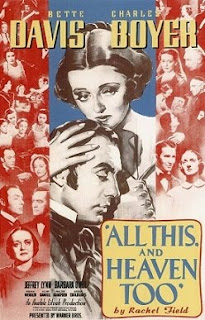Yesterday, I remained indoors as much as possible, where I watched another film from the selection of 1940's Best Picture nominees...

.jpg)

All This, and Heaven Too
Director:
Anatole Litvak
Screenplay:
Casey Robinson
(based on the novel by Rachel Field)
Starring:
Bette Davis, Charles Boyer, Barbara O'Neil, Jeffrey Lynn
Academy Awards:
3 nominations
0 wins
Mademoiselle Henriette Deluzy (Davis) is the new French teacher at a girls school in mid-nineteenth-century England. Her first day is marred by taunts from her impudent students, who have heard rumours that their teacher was involved in a tragic and sordid scandal, forcing her to leave France. Rather than let the gossip run wild, Deluzy throws away the lesson plan for the day and attempts to set the record straight by narrating her own version of the story.
Several years ago, Mademoiselle Henriette Desportes (as she was known before scandal forced her to change her name) served as governess to the four children of Duc de Praslin (Boyer) and his capriciously moody wife, the Duchesse de Praslin (O'Neil). While Henriette wins the hearts of all the children, she is subjected to the Duchesse's constant emotional episodes. This erratic behaviour has already pushed the Duc away from his wife and he is now secretly smitten with Henriette, who just as secretly reciprocates. Although both dare not act on their feelings, stifling any urges they have, the Duchesse's paranoia translates into bitter jealousy, making life miserable for everybody involved.
The opening of All This, and Heaven Too successfully sets up an intriguing mystery, releasing just the right amount of information so as to make the audience want more. It is this gossip in all of us that delights in uncovering the facts of any juicy scandal, so when Henriette begins to tell her tale, we can't wait to hear all the sordid details. It turns out, however, that the story is actually heart-breakingly poignant, but by the time we have heard it all, we are so invested in the characters, that we can forgive the lack of sordidness.
.jpg)
The screenplay is a prime example of the power of inference. Just like a good British period drama about forbidden love (the ones that Merchant-Ivory do so well), this picture manages to communicate the strong desire and yearning of its two lead characters without having them say a word about it. The love affair between Henriette and the Duc is understated, full of longing looks and subtext-filled metaphors, without any overt mention that they are even attracted to each other. Other people gossip about the pair, but neither Henriette nor the Duc ever let slip their true feelings. Until the end, of course - and I'm about to ruin it for you now - when the Duc makes a deathbed confession of his deep affection for Henriette, a passionate declaration that is made all the more satisfying due to the fact that he has remained so silent about it up until that point. It is like an enormous weight has been lifted and all the tension that has pervaded the story's atmosphere simply fades away.
Bette Davis and Charles Boyer are both superb in their subtlety. Barbara O'Neil (who you may remember as Scarlett O'Hara's mother) is frighteningly convincing as the crazy bitch, earning herself the film's only acting nomination. You may also recognise Isabelle, the eldest daughter. That's 60s sitcom mom June Lockhart. And I cannot go without mentioning Richard Nichols as the youngest child, Reynald, who is possibly the cutest child to appear on screen. He even manages to remain adorable while delivering (in an equally adorable Southern drawl) the morbidly philosophical line, "But my white rabbit died and I loved it better than the brown one that didn't."

.jpg)

.jpg)




.jpg)




